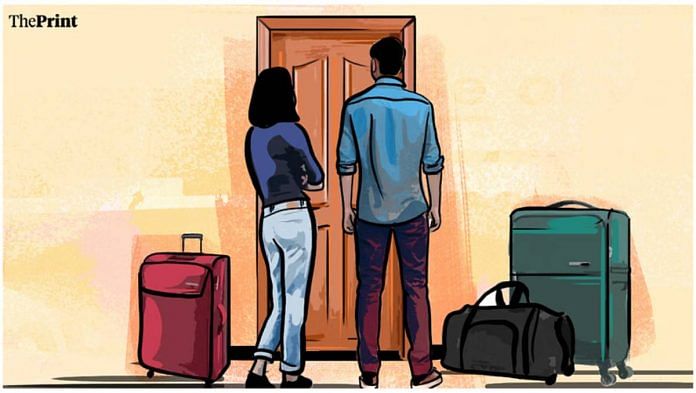In India, criminal law has become an omnipresent instrument for regulating every aspect of our lives—ranging from routine compliances to deterring serious offences. This not only burdens the criminal justice system but also makes life more difficult for citizens. And the recently enacted Uttarakhand Uniform Civil Code appears to perpetuate the concerning trend of overcriminalisation.
Enacted to supposedly achieve uniformity in the regulation of marriage successions and other relationships, the UUCC criminalises various aspects of personal lives, including live-in relationships and various customary religious practices. The law also criminalises failure to register marriage and divorce and submitting false documents and forgery. This raises a critical question of whether criminalisation is appropriate and effective for regulating personal law.
Criminalisation of live-in relationships
The UUCC, under Section 381, mandates the registration of live-in relationships through a “statement of live-in relationship”. Failure to submit the statement carries a punishment of imprisonment of up to three months or a fine of up to Rs 10,000. Additionally, the registrar has been vested with the authority to send notices to couples suspected to be in live-in relationships, either on a complaint or suo-moto, requiring them to submit statements. Failing to file a statement after receiving such a notice has been made punishable with imprisonment of up to six months or a fine of up to Rs 25,000.
While granting statutory recognition to live-in relationships is a positive step, criminalising non-registration will have unintended consequences. Individuals often choose live-in relationships for various reasons, including avoiding the legal complexities of marriage, societal limitations on inter-religious or inter-caste unions, or simply preferring independent cohabitation without the intrusions of the state. The mandatory registration requirement, however, intrudes unnecessarily into private lives, adding another burden to the entire arrangement. This, coupled with the registrar’s power to refer statements to police officers for initiating action merely on the basis of suspicion, raises serious concerns about surveillance, communal and casteist targeting, and harassment. This will particularly impact interfaith and inter-caste couples living together, who may already be facing societal stigma and discrimination apart from outright violence.
Also read: Uttarakhand UCC gives live-in couples more burdens. There are very few returns
Criminalisation of customs and practices
The UUCC criminalises dissolution of marriage by any mode other than what is provided under the code. Modes of divorce under Muslim personal law, including talaq-us-sunnat (pronouncement of divorce by the husband during the period between menstruations followed by sexual abstinence), talaq-i-bidat (triple talaq), khula (divorce at the instance of the wife), muba’arat (divorce by mutual consent), or zihar (availability of judicial divorce to wife if husband compares her to any woman within prohibited degrees of relationship), recognised by the Muslim Shariat Application Act 1937 have not just been outlawed but also criminalised. The code also criminalises customs or practices that may impose conditions for remarriage. Nikah halala, or the requirement to marry or have intercourse with another person to remarry, would be accordingly outlawed and subject to criminal punishment, including imprisonment and fine.
Outlawing regressive practices might be a desirable step. However, criminal implications, especially involving a jail term, will have harsh and disparate implications for marginalised communities. In a country like India, with a large-scale knowledge and awareness divide, imposing imprisonment on individuals following their local customary practices appears to be a disproportionately harsh measure. Moreover, the criminalisation of practices that are not particularly regressive such as muba’arat indicates contempt toward the practices of a particular community and is not a genuine attempt at reform.
The UUCC also criminalises solemnising marriages within the prohibited degrees of relationships unless a customary practice sanctions it. This mirrors existing provisions in the Hindu Marriage Act 1955 and the Special Marriage Act 1954, both of which allow similar exceptions for customary practices. However, the UUCC introduces an additional layer of complexity — it stipulates that the exception only applies when the custom does not violate ‘public policy and morality’. This makes the provision extremely ambiguous and arbitrary due to the usage of vague terms like ‘public policy’ and ‘morality’, which are purely subjective. This increases the risk of selective and arbitrary application of the law to individuals belonging to certain minority communities or oppressed social groups.
Also read: Uttarakhand UCC doesn’t reform Indian family law. Gender equality was never its intention
Reimagining the role of criminal law
The state often relies on criminal law’s deterrent capabilities for law enforcement and to ensure compliance. However, the criminalisation of customary practices and non-registration of live-in relationships and marriage creates a chilling effect on individual choice and disproportionately burdens not just the marginalised communities but also the criminal justice system. Further, it is impossible to ignore the specificity of criminalisation targeted at the practices of one particular community. The intent of the criminal sanctions provided in the UUCC thus appears to be leaning toward the humiliation of such practices rather than any larger social good. There is a need to reimagine the role of criminal law and to assess if using criminal law is the most effective tool for achieving the UUCC’s goals. Could civil penalties achieve similar results without overburdening the already strained criminal justice system?
The authors are with the Vidhi Centre for Legal Policy. Views are personal.
(Edited by Humra Laeeq)



